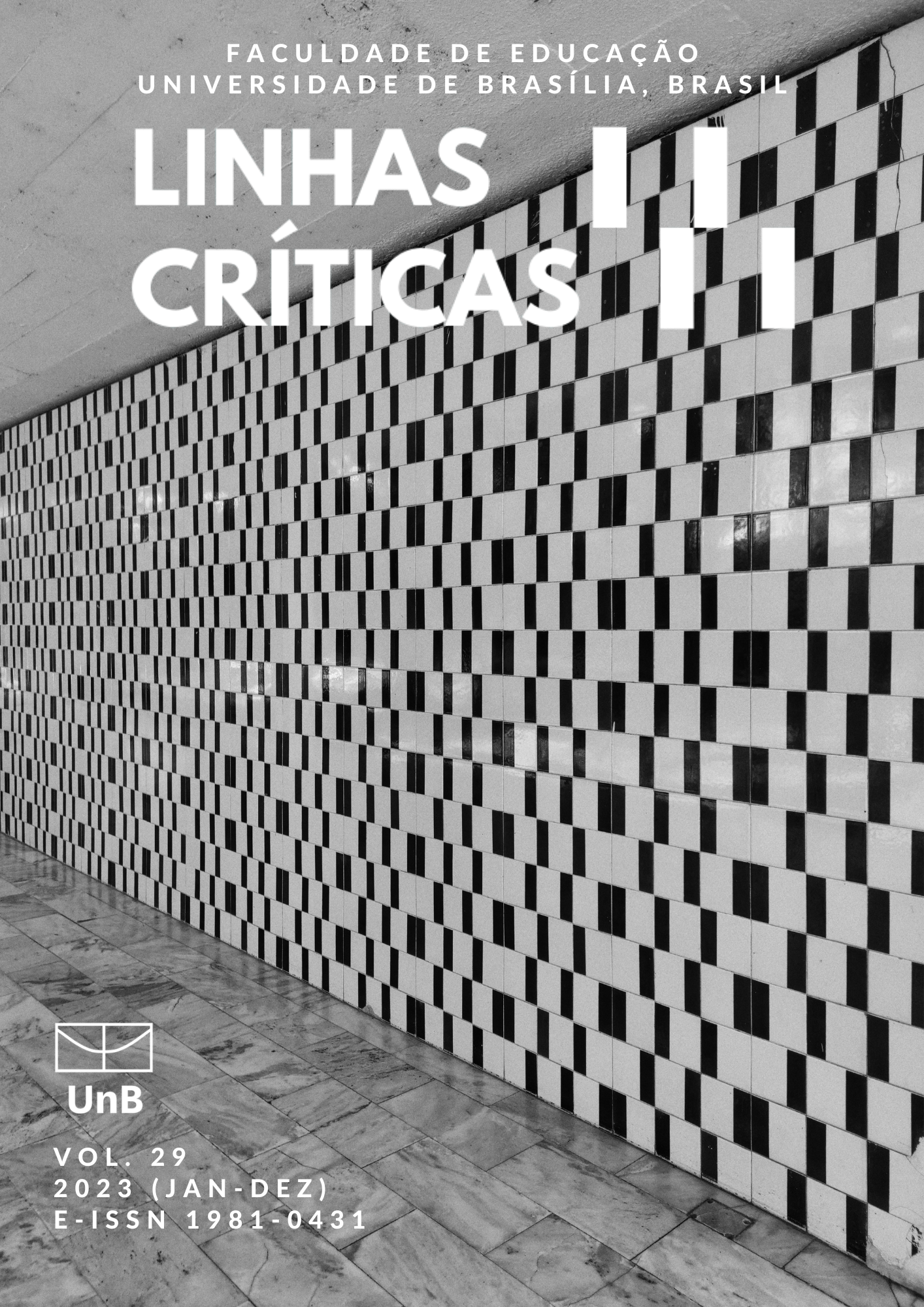Listening to children as they play
DOI:
https://doi.org/10.26512/lc29202350573Keywords:
Listening to children, Play, Early Childhood Education, Peer GroupAbstract
Utilizing interpretative resources available to them, children reveal what they know and create meanings with their peers. We then sought to listen to a group of seven 5-year-old children about a topic that is part of their daily experiences — the family. Through observation of plays fostered, video recorded, and qualitatively analyzed by the researcher, children appear to be protagonists of their microcultures in early childhood education: they create characters and weave relationships constrained to a family scenario. Therefore, listening to children means allowing them to express affections, interests, conflicts, et cetera, taking them as evidence of their understanding and conceptions.
Downloads
References
Abramowicz, A. (2018). Sociologia da Infância: traçando algumas linhas. Contemporânea, 8(2), 371-383. https://www.contemporanea.ufscar.br/index.php/contemporanea/article/view/653/pdf
Bruner, J. (2008). Actos de significado: para uma psicologia cultural. Edições 70.
Buss-Simão, M. (2012). Relações sociais em um contexto de educação infantil: um olhar sobre a dimensão corporal na perspectiva das crianças pequenas. [Tese de doutorado, Universidade Federal de Santa Catarina]. Repositório Institucional da UFSC. https://repositorio.ufsc.br/handle/123456789/96146
Carvalho, A. M. A. (2021). Psicologia do Desenvolvimento: Há Questões Novas? Cadernos de Psicologia, 1(1). https://doi.org/10.9788/CP2021.1-02
Carvalho, A. M. A., Pedrosa, M. I., & Império-Hamburger, A. (in memoriam). (2020). Revendo conceitos e princípios para a análise da dinâmica interacional de crianças. Em A. M. A. Carvalho, & M. I. Pedrosa (Orgs.). Física e psicologia: um ensaio de interdisciplinaridade (pp. 43-70). Edicon.
Cooke, T. (2006). ‘Tanto, Tanto!’ Livro de Literatura Infantil. Ática.
Corsaro, W. A. (1988). Routines in the peer culture of American and Italian nursery school children. Sociology of Education, 61(1). https://doi.org/10.2307/2112305
Corsaro, W. A. (1992). Interpretive reproduction in children’s peer cultures. Social Psychology Quarterly, 55(2), 160-177. https://doi.org/10.2307/2786944
Corsaro, W. A. (2009). Reprodução interpretativa e cultura de pares. Em F. Müller, & A. M. A. Carvalho (Orgs.). Teoria e prática na pesquisa com crianças: diálogos com William Corsaro (31-50). Cortez.
Corsaro, W. A. (2011). Sociologia da Infância. Artmed.
Ferreira, M. M. M. (2005). Brincar às arrumações, arrumando ou... entre a ordem institucional adulta e a ordem instituinte infantil, as crianças como actores sociais no jardim de infância. Reflexão e Ação, 13(1), 115-132. https://hdl.handle.net/10216/63178
Ferreira, M. M. M. (2008). “Branco demasiado” ou… reflexões epistemológicas, metodológicas e éticas acerca da pesquisa com crianças. Em M. J. Sarmento, & C. S. Maria. Estudos da Infância, educação e práticas sociais (pp. 143-162). Vozes.
Ferreira, P. N. (2016). “A gente tá fazendo um feitiço”: cultura de pares e experiência estética no ateliê de artes plásticas em contexto de educação infantil. [Tese de doutorado, Universidade Federal de Alagoas]. Repositório Institucional da UFAL. www.repositorio.ufal.br/handle/riufal/1589
Haddad, L., & Maynart, R. C. (2017). A compreensão de relações familiares pelas crianças em situação de brincadeira em contexto de educação infantil. Zero-a-seis, 19, 69. https://doi.org/10.5007/1980-4512.2017v19n35p69
Lira, P. P., & Pedrosa, M. I. (2016). Processos de significação sobre família em brincadeiras de crianças em acolhimento institucional. Psicologia: Teoria e Pesquisa, 32(3). https://doi.org/10.1590/0102-3772e323214
Lucena, J. M. F., Amorim, K. S., & Pedrosa, M. I. (2021). Aprendizagem cultural por crianças de dois anos em seu grupo de brinquedo. Estudos e Pesquisas em Psicologia, 3. https://doi.org/10.12957/epp.2021.62712
Maynart, R. C. (2017). Brincadeira de família em contexto de educação infantil: processos de significação e cultura de pares. [Tese Doutorado, Universidade Federal de Alagoas]. Repositório Institucional da UFAL. http://www.repositorio.ufal.br/handle/riufal/2001
Maynart, R. C., & Haddad, L. (2019). A brincadeira e o processo de constituição do eu psíquico da criança: implicações para a Educação Infantil. Edufal.
Oliveira, E. M. B. de, & Haddad, L. (2020). Delineando posicionamentos de gênero em contexto de educação infantil a partir de oficinas de brincadeiras. Humanidades & Inovação, 7, 309-323. https://revista.unitins.br/index.php/humanidadeseinovacao/article/view/2147
Rocha, E. A. C. (2008). Por que ouvir as crianças? Algumas questões para um debate científico multidisciplinar. Em S. H. V. Cruz (Org.). A criança fala: a escuta de crianças em pesquisas (pp. 141-157). Cortez.
Rogoff, B. (2005). A natureza cultural do desenvolvimento humano. Artmed.
Santos, C. P. S. (2015). A ontogênese das representações sociais de família em crianças de 4 a 6 anos. [Tese de doutorado, Universidade Federal de Pernambuco]. Repositório Institucional da UFPE. https://repositorio.ufpe.br/handle/123456789/14964
Sarmento, M. J (2005). Gerações e alteridade: interrogações a partir da sociologia da infância. Educação & Sociedade, 26(91), 361-378. https://doi.org/10.1590/S0101-73302005000200003
Simões, P. M. U., & Resnick, R. (2019). A pesquisa das infâncias como possibilidade de encontros e trocas de conhecimento. Em E. R. C. Morais, F. M. L. Cruz, M. F. S. Santos, & R. L. S. Aléssio (Orgs.). Interfaces entre a psicologia do desenvolvimento e a psicologia social (pp. 33-55). UFPE. https://editora.ufpe.br/books/catalog/view/67/70/199
Vigotski, L. S. (2008). A brincadeira e o seu papel no desenvolvimento psíquico da criança. Revista Virtual de Gestão de Iniciativas Sociais, 23-36. https://atividart.files.wordpress.com/2016/05/a-brincadeira-e-seu-papel-no-desenvolvimento-psiquico-da-crianc3a7a.pdf
Wallon, H. (2008). Do ato ao pensamento: ensaio de psicologia comparada. Vozes.
Downloads
Published
How to Cite
Issue
Section
License
Copyright (c) 2023 Renata Maynart, Lenira Haddad, Maria Isabel Pedrosa

This work is licensed under a Creative Commons Attribution 4.0 International License.
Authors who publish in this journal agree to the following terms:
-Authors maintains the copyright and grants the journal the right of first publication, the work being simultaneously licensed under the Creative Commons Attribution License which allows the sharing of the work with recognition of the authorship of the work and initial publication in this journal.
- Authors are authorized to enter into additional contracts separately, for non-exclusive distribution of the version of the work published in this journal (eg publish in institutional repository or as a book chapter), with acknowledgment of authorship and initial publication in this journal.
-Authorers are allowed and encouraged to publish and distribute their work online (eg in institutional repositories or on their personal page) at any point before or during the editorial process, as this can generate productive changes as well as increase the impact and the citation of published work (See The Effect of Free Access).



